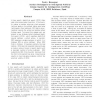Free Online Productivity Tools
i2Speak
i2Symbol
i2OCR
iTex2Img
iWeb2Print
iWeb2Shot
i2Type
iPdf2Split
iPdf2Merge
i2Bopomofo
i2Arabic
i2Style
i2Image
i2PDF
iLatex2Rtf
Sci2ools
IJCAI
1997
1997
Interleaved Depth-First Search
In tree search, depth-first search (DFS) often uses ordering successor heuristics. If the heuristic makes a mistake ordering a bad successor (without goals in its subtree) before good ones (with goals in their subtrees), DFS has to unsuccessfully traverse the whole bad subtree before finding a goal. To prevent this useless work, we present a new strategy called interleaved depthfirst search (IDFS), which searches depth-first several subtrees —called active— in parallel. IDFS assumes a single processor on which it interleaves DFS on active subtrees. When IDFS finds a mistake, it traverses partially the bad subtree. IDFS does not reexpand nodes and uses a memory amount linear in search depth (with a bounded number of active subtrees). IDFS outperforms DFS if the heuristic improves from the first to the second tree level. Experimental results on hard solvable problems confirm the practical validity of IDFS.
Related Content
| Added | 01 Nov 2010 |
| Updated | 01 Nov 2010 |
| Type | Conference |
| Year | 1997 |
| Where | IJCAI |
| Authors | Pedro Meseguer |
Comments (0)

